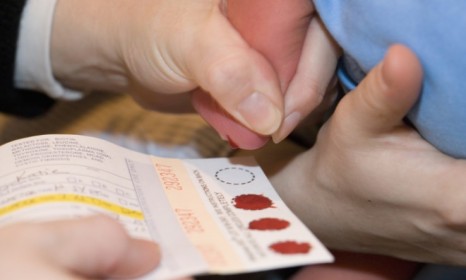Should parents have their kids genetically tested for diseases?
Pediatricians advise against screening children for health problems they might face as adults. But many parents want to do it anyway

A free daily email with the biggest news stories of the day – and the best features from TheWeek.com
You are now subscribed
Your newsletter sign-up was successful
Genetic health screening is becoming increasingly available and popular — so much so that many parents who have undergone it say they would also consider testing their children for the risk later in life of cancer, diabetes, and other diseases, according to a new study published in the journal Pediatrics. But doctors advise against using the tests on kids, because the results aren't conclusive, and can cause unnecessary alarm, or false security. Is gene testing for kids really a bad idea?
Don't subject kids to these unreliable tests: Direct-to-consumer gene screening is easy, says Helen Wallace of the genetic science lobby group Genewatch UK, as quoted by BBC News. But it also frequently gives "misleading results," because many common conditions, including obesity and cancer, "are "not predicable from a person's genes." Parents should wait for their kids to grow up, and then decide for themselves whether to be tested.
"Parents 'want child gene tests'"
The Week
Escape your echo chamber. Get the facts behind the news, plus analysis from multiple perspectives.

Sign up for The Week's Free Newsletters
From our morning news briefing to a weekly Good News Newsletter, get the best of The Week delivered directly to your inbox.
From our morning news briefing to a weekly Good News Newsletter, get the best of The Week delivered directly to your inbox.
Wait, the results could be helpful: If parents go into the screening "hoping for a clean bill of health for their children," says Bonnie Rochman at TIME, they may not necessarily get one. But that doesn't mean no good will come from it. "They might take positive action and ensure their child eats well and exercises regularly — something pediatricians recommend regardless of test results."
"Genetic testing for kids: Is it a good idea?"
It all depends on how you use the information: No matter how controversial direct-to-consumer gene tests are, says Katherine Hobson at The Wall Street Journal, plenty of parents will give them a try. But there's no guarantee the results will provide a "teachable moment" to help kids adopt healthier eating and exercise habits. Isn't it just as likely that a kid who learns he's at a lower-than-average risk of high cholesterol as an adult might "stay inside for another round of Halo rather than go outside and kick a soccer ball around?"
"Parents, kids and genetic testing for adult-onset diseases"
A free daily email with the biggest news stories of the day – and the best features from TheWeek.com
-
 Film reviews: ‘Wuthering Heights,’ ‘Good Luck, Have Fun, Don’t Die,’ and ‘Sirat’
Film reviews: ‘Wuthering Heights,’ ‘Good Luck, Have Fun, Don’t Die,’ and ‘Sirat’Feature An inconvenient love torments a would-be couple, a gonzo time traveler seeks to save humanity from AI, and a father’s desperate search goes deeply sideways
-
 Political cartoons for February 16
Political cartoons for February 16Cartoons Monday’s political cartoons include President's Day, a valentine from the Epstein files, and more
-
 Regent Hong Kong: a tranquil haven with a prime waterfront spot
Regent Hong Kong: a tranquil haven with a prime waterfront spotThe Week Recommends The trendy hotel recently underwent an extensive two-year revamp